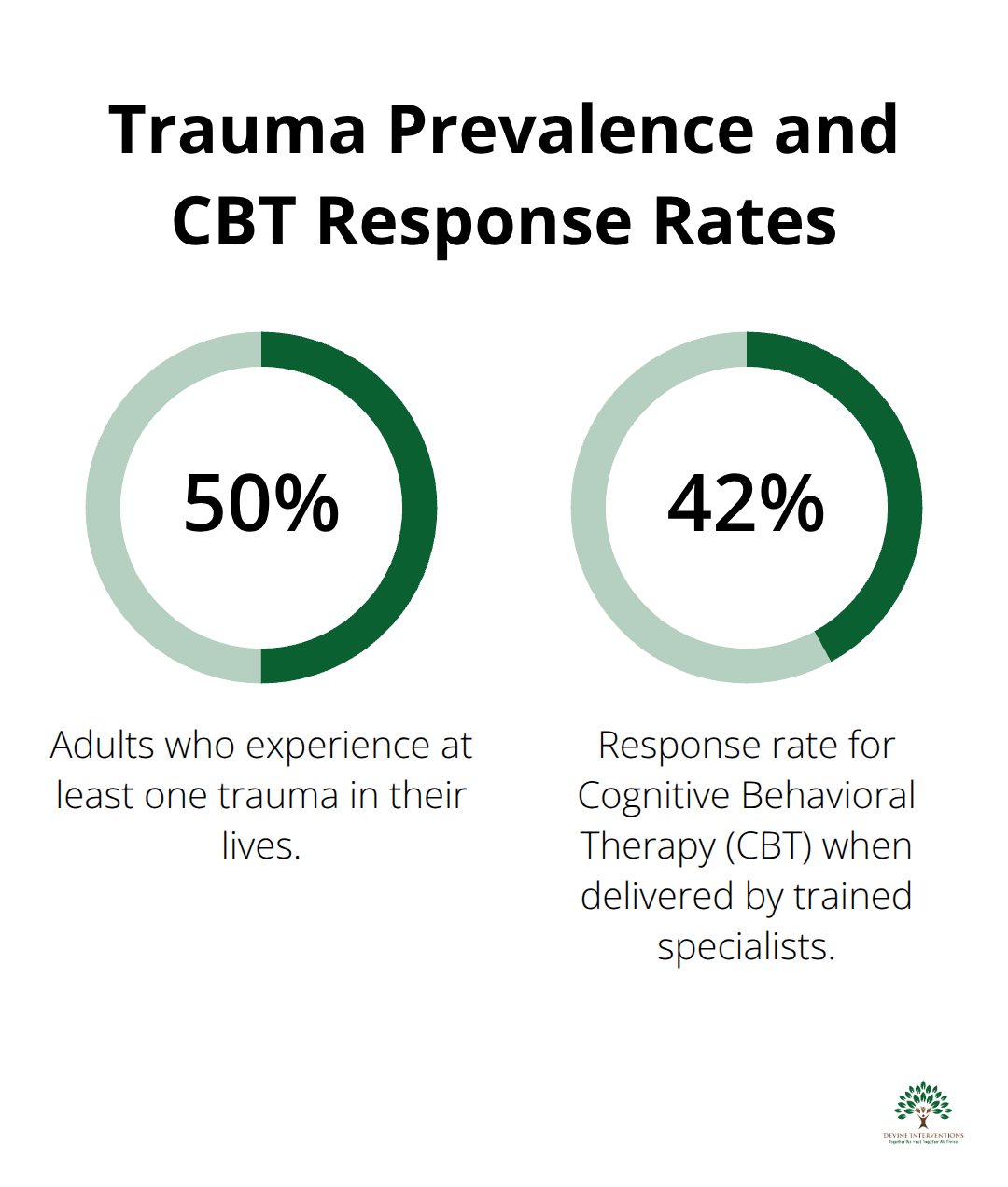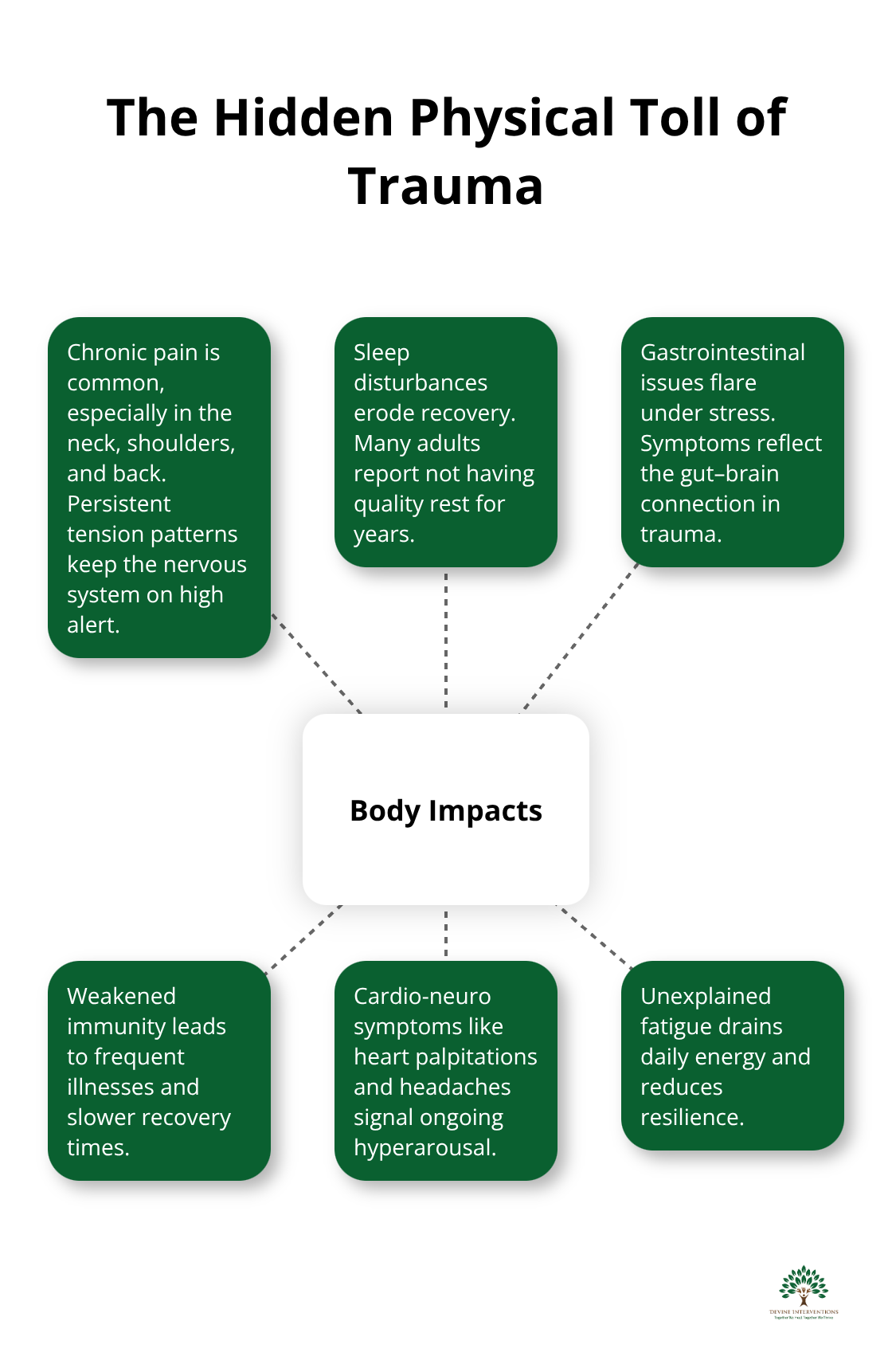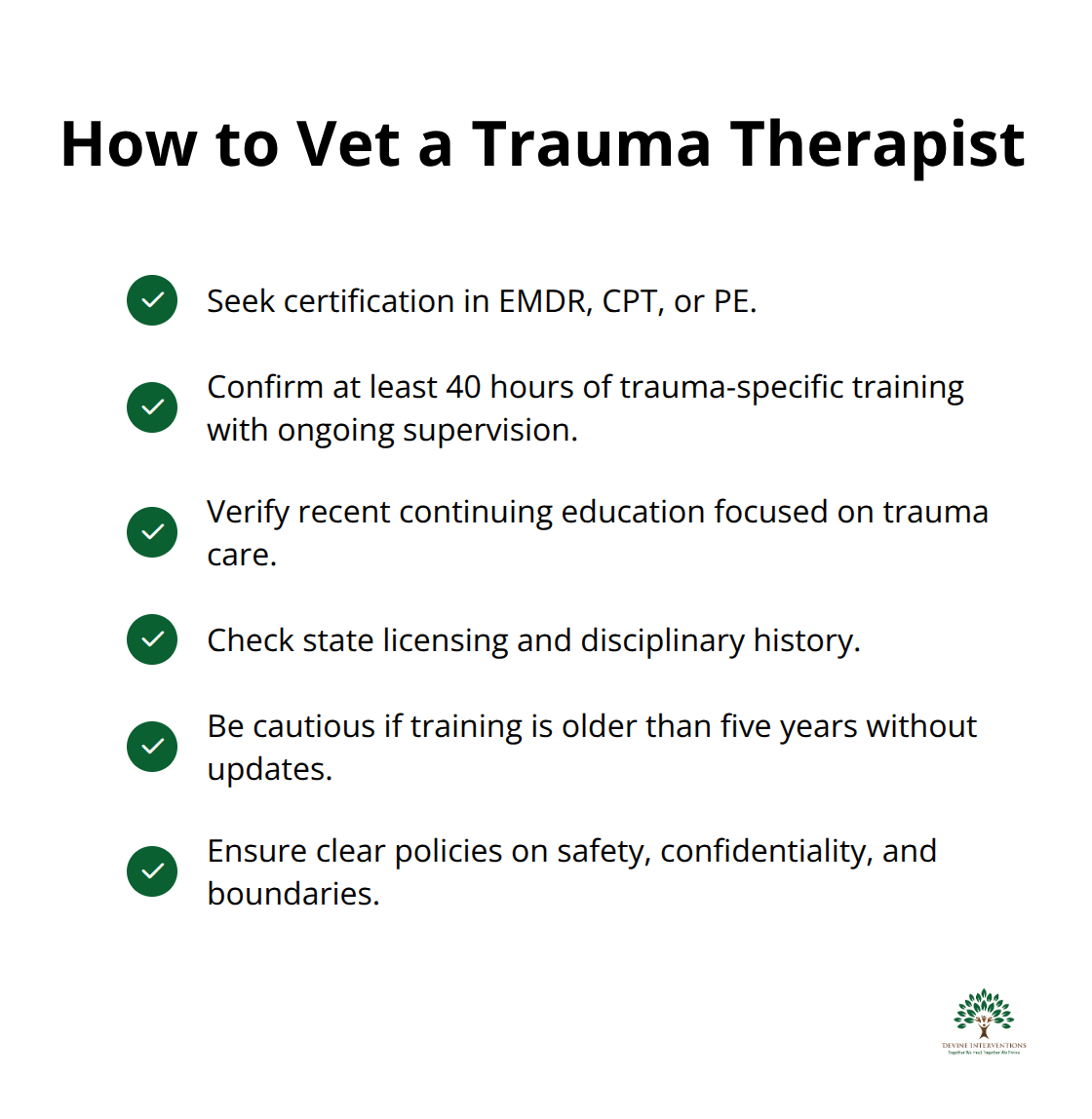Trauma affects millions of adults, creating lasting impacts that extend far beyond the initial experience. Many people struggle with symptoms for years without realizing effective treatment options exist.
We at Devine Interventions understand that finding the right trauma therapy techniques for adults can feel overwhelming. This guide explores proven approaches that help adults process trauma and reclaim their lives.
What Trauma Really Looks Like in Adults
Over 50% of people experience at least one trauma in their lives according to research, yet many adults fail to recognize how deeply these experiences affect their daily lives. Adult trauma extends far beyond the obvious incidents most people imagine.

Common Forms of Adult Trauma
Workplace harassment creates lasting psychological wounds that affect career confidence and professional relationships. Medical emergencies shatter your sense of safety and control over your body. Sudden loss of loved ones leaves emotional scars that influence how you approach future relationships. Financial devastation destroys your sense of security and self-worth. Relationship betrayal rewrites your ability to trust others completely.
Childhood abuse that went unprocessed often resurfaces in adulthood, creating behavioral patterns that seem completely unrelated to the original trauma. These experiences shape your worldview in ways you might not connect to past events.
The Hidden Physical Toll
Trauma shows up in your body long before you recognize it mentally. Adults with unprocessed trauma frequently develop chronic pain, particularly in the neck, shoulders, and back areas. Sleep becomes elusive, with many people reporting they haven’t experienced quality rest in years.
Gastrointestinal problems affect trauma survivors significantly. Your immune system weakens significantly, which leads to frequent illnesses and slow recovery times. Heart palpitations, persistent headaches, and unexplained fatigue drain your energy every single day.

When Relationships Become Battlegrounds
Trauma rewrites how you connect with others, often in ways that push away the very support you need most. Trust becomes nearly impossible to establish, which causes you to either isolate completely or become hypervigilant about others’ motives.
Emotional outbursts over minor issues strain partnerships and friendships beyond repair. Many adults find themselves stuck in destructive relationship patterns, choosing partners who recreate familiar dynamics from their trauma. Work relationships suffer as concentration problems and emotional reactivity affect professional performance (sometimes costing promotions or job security entirely).
These symptoms don’t exist in isolation-they interconnect and compound each other, creating a web of challenges that traditional coping methods can’t address. Professional trauma therapy techniques offer proven pathways to break these cycles and restore healthy function.
Evidence-Based Trauma Therapy Techniques
Three specific therapy approaches consistently outperform all other methods for adult trauma recovery based on extensive research data. Cognitive Behavioral Therapy for trauma processing shows 42% response rates when trained specialists deliver treatment according to multiple clinical studies. This approach restructures the thought patterns that keep trauma symptoms active in your daily life.
Cognitive Behavioral Therapy Rewrites Trauma Responses
Therapists guide you through specific exercises that challenge distorted beliefs about safety, trust, and self-worth that developed after traumatic experiences. Sessions typically run 12-16 weeks with homework assignments between meetings that accelerate your progress significantly. The structured approach helps you identify triggers before they overwhelm your emotional system.
CBT practitioners teach you concrete skills to manage intrusive thoughts and emotional flashbacks. You learn to recognize when trauma responses activate and apply specific techniques to regain control. Research shows participants who complete full CBT protocols maintain their improvements for years after treatment ends.
EMDR Transforms How Your Brain Stores Memories
Eye Movement Desensitization and Reprocessing produces results faster than traditional talk therapy approaches. Research shows moderate to large improvements for trauma survivors when they work with certified EMDR practitioners. The bilateral stimulation helps your brain reprocess stuck traumatic memories without requiring you to relive every painful detail verbally.
Veterans who participate in EMDR treatment programs show measurable reductions in nightmares, flashbacks, and hypervigilance within eight weeks according to Department of Veterans Affairs data. The technique allows your brain to file traumatic memories properly instead of keeping them active in your present-moment awareness.
Somatic Approaches Address Body-Stored Trauma
Trauma lives in your nervous system and muscle memory long after the original event ends. Somatic approaches address trauma stored in your body through specific breathing techniques, progressive muscle relaxation, and movement therapy that releases physical tension patterns. These methods work particularly well for people who struggle to verbalize their trauma experiences.
Somatic Experiencing focuses on bodily awareness to release stored trauma energy promoting holistic healing that traditional talk therapy often misses. Many clients report immediate physical relief after their first somatic session, with chronic pain and sleep problems improving within weeks.
Treatment Success Depends on Therapist Training
Trauma-informed care principles separate effective treatment from generic counseling approaches that often retraumatize clients accidentally. Your therapist must demonstrate specialized training in trauma treatment methods rather than general counseling credentials. Ask potential therapists directly about their trauma-specific education, supervision hours, and ongoing training requirements.
Effective trauma therapists create safety through consistent scheduling, clear boundaries, and collaborative treatment planning that puts you in control of session pacing and content depth. The therapeutic relationship becomes the foundation for all other healing work, which makes therapist selection the most important decision in your recovery process.
How Do You Pick the Right Trauma Therapist
Your recovery depends entirely on selecting a therapist with specialized trauma training, not just general counseling credentials. Most therapists receive minimal trauma education in their basic programs, which creates dangerous gaps in treatment quality. Ask potential therapists directly about their trauma-specific certifications, supervision hours, and continuing education requirements before you schedule your first appointment.
Verify Specialized Training and Credentials
Look for therapists certified in specific trauma modalities like EMDR, CPT, or PE rather than those who claim general trauma experience. The International Society for Traumatic Stress Studies maintains directories of properly trained professionals who meet rigorous standards. Therapists should complete 40 hours of trauma-specific training plus ongoing supervision to treat trauma effectively.
Many therapists advertise trauma services without adequate preparation, which can worsen your symptoms significantly. Check state licensing boards to verify credentials and confirm no disciplinary actions exist against potential providers. Therapists who completed their training more than five years ago without recent continuing education may lack current best practices.

Assess Treatment Environment and Safety Protocols
Your therapist’s office setup reveals their understanding of trauma-informed care principles immediately. Effective trauma therapists position chairs at equal heights, provide clear sight lines to exits, and maintain consistent appointment scheduling that builds predictability. They explain their policies about confidentiality, emergency contacts, and session boundaries during your initial consultation.
Therapists who rush through intake processes or seem uncomfortable discussing trauma symptoms lack the specialized skills you need for recovery. The therapeutic relationship becomes your foundation for healing, so trust your instincts about safety and connection during initial meetings.
Evaluate Communication Style and Approach
Pay attention to how potential therapists respond to your questions about their methods and experience. Qualified trauma therapists explain their approach clearly without using excessive jargon or making unrealistic promises about timeline or outcomes. They should acknowledge that trauma recovery takes time and varies significantly between individuals.
Therapists who pressure you to commit to long-term contracts immediately or dismiss your concerns about specific treatment methods show red flags. The right therapist validates your experiences while maintaining professional boundaries (never sharing personal trauma stories or becoming overly emotional during sessions).
Consider Practical Factors That Support Consistency
Location, scheduling flexibility, and fee structure directly impact your ability to maintain consistent treatment. Trauma therapy requires regular attendance to build momentum, so choose a therapist whose practical arrangements support your long-term commitment. Therapists who frequently cancel or reschedule appointments disrupt the stability that trauma recovery requires.
Insurance coverage and payment options matter significantly since trauma treatment often extends beyond what insurance companies consider standard care duration. Discuss financial arrangements upfront to avoid treatment interruptions due to cost concerns. Consider starting a mental wellness challenge alongside therapy to support your overall recovery process.
Final Thoughts
Professional trauma therapy techniques for adults transform lives in ways that self-help methods simply cannot match. Research consistently shows that adults who complete evidence-based trauma treatment experience significant reductions in symptoms within three to four months. These improvements extend far beyond symptom relief and restore your ability to form healthy relationships, maintain career stability, and experience genuine joy again.
You don’t have to navigate this journey alone when you take the first step toward recovery. Schedule a consultation with a qualified trauma specialist who can assess your specific needs and recommend the most effective treatment approach. Many people delay help for years, but early intervention prevents trauma symptoms from becoming more entrenched and difficult to treat (which makes recovery more challenging later).
We at Devine Interventions understand that reaching out for trauma treatment feels overwhelming, especially when trust has been damaged by past experiences. Your trauma doesn’t define you, and recovery is absolutely achievable with the right support. Contact Devine Interventions today to begin your journey toward lasting healing and reclaim the life you deserve.







